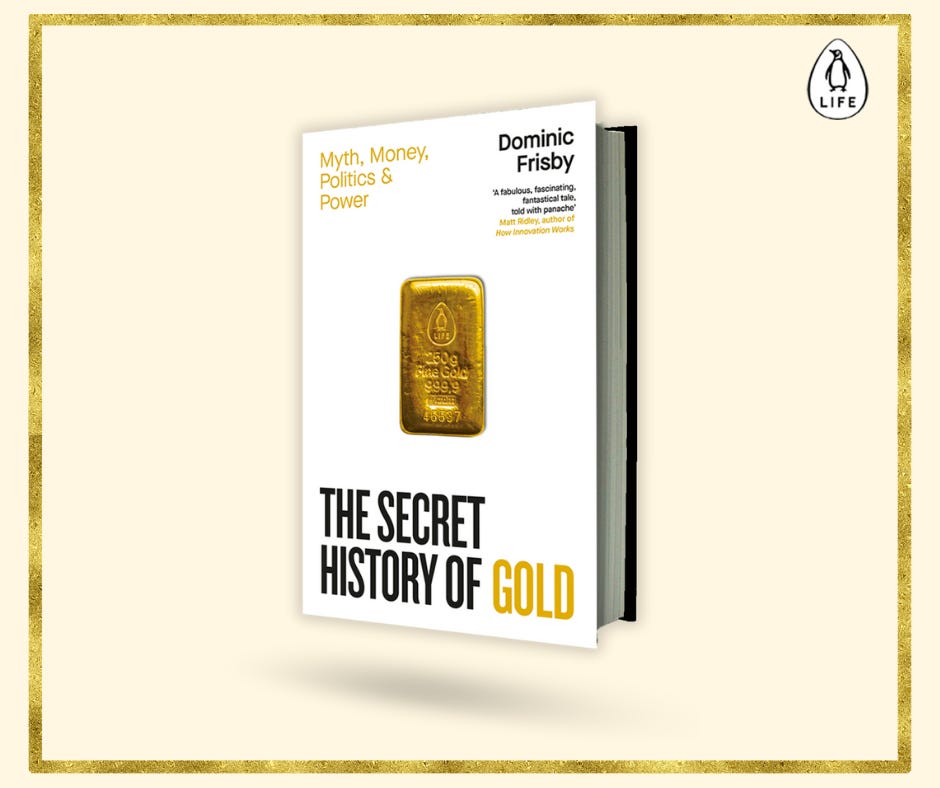Podcast Episode Details
Back to Podcast Episodes
The Useless Metal That Rules the World
The Secret History of Gold comes out this week. Here for your viewing pleasure is a fim about gold based on the first chapter.
“Gold will be slave or master”Horace
In 2021, a metal detectorist with the eyebrow-raising name of Ole Ginnerup Schytz dug up a hoard of Viking gold in a field in Denmark. The gold was just as it was when it was buried 1,500 years before, if a little dirtier. The same goes for the jewellery unearthed at the Varna Necropolis in Bulgaria in 1972. The beads, bracelets, rings and necklaces are as good as when they were buried 6,700 years ago.
In the Egyptian Museum in Cairo, there is a golden tooth bridge — a gold wire used to bind teeth and dental implants — made over 4,000 years ago. It could go in your mouth today.
No other substance is as long-lasting as gold — not diamonds, not tungsten carbide, not boron nitride. Gold does not corrode; it does not tarnish or decay; it does not break down over time. This sets it apart from every other substance. Iron rusts, wood rots, silver tarnishes. Gold never changes. Left alone, it stays itself. And it never loses its shine — how about that?
Despite its permanence, you can shape this enormously ductile metal into pretty much anything. An ounce of gold can be stretched into a wire 50 miles long or plate a copper wire 1,000 miles long. It can be beaten into a leaf just one atom thick. Yet there is one thing you cannot do and that is destroy it. Life may be temporary, but gold is permanent. It really is forever.
This means that all the gold that has ever been mined, estimated to be 216,000 tonnes, still exists somewhere. Put together it would fit into a cube with 22-metre sides. Visualise a square building seven storeys high — and that would be all the gold ever.
With some effort, you can dissolve gold in certain chemical solutions, alloy it with other metals, or even vaporise it. But the gold will always be there. It is theoretically possible to destroy gold through nuclear reactions and other such extreme methods, but in practical terms, gold is indestructible. It is the closest thing we have on earth to immortality.
Perhaps that is why almost every ancient culture we know of associated gold with the eternal. The Egyptians believed the flesh of gods was made of gold, and that it gave you safe passage into the afterlife. In Greek myth, the Golden Apples of the Hesperides, which Hercules was sent to retrieve, conferred immortality on whoever ate them. The South Americans saw gold as the link between humanity and the cosmos. They were not far wrong.
Gold was present in the dust that formed the solar system. It sits in the earth’s crust today, just as it did when our planet was formed some 4.6 billion years ago. That little bit of gold you may be wearing on your finger or around your neck is actually older than the earth itself. In fact, it is older than the solar system. To touch gold is as close as you will ever come to touching eternity.
And yet the world’s most famous investor is not impressed.
‘It gets dug out of the ground in Africa, or some place,’ said Warren Buffett. ‘Then we melt it down, dig another hole, bury it again and pay people to stand around guarding it. It has no utility. Anyone watching from Mars would be scratching their head.’
He’s right. Gold does nothing. It does not even pay a yield. It just sits there inert. We use other metals to construct things, cut things or conduct things, but gold’s industrial uses are minimal. It is a good conductor of electricity, but copper and silver are better and cheaper. It has some use in dentistry, medical applications and nanotechnology. It is finding more and more use in outer space — back whence it came — where it is used to coat spacecraft, astronauts’ visors and heat shields. But, in the grand scheme of things, these uses are p
Published on 1 month, 1 week ago